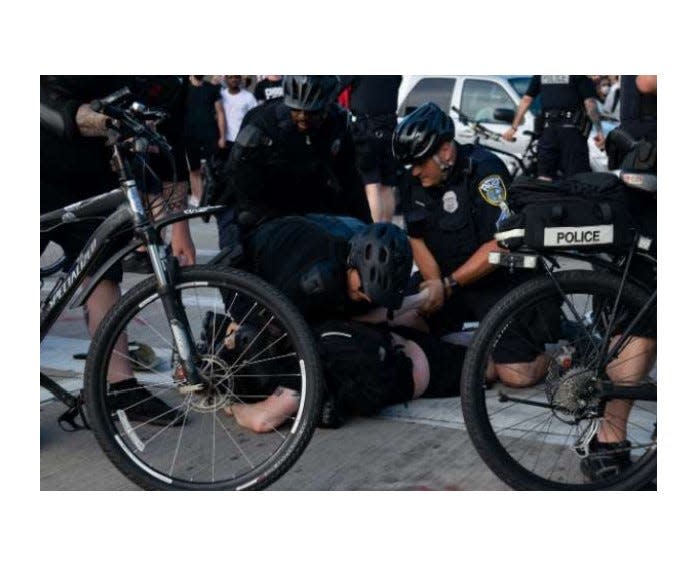A bicyclist was forcibly arrested during a George Floyd protest in 2020. Here's what we know about the incident and a six-figure settlement Milwaukee may soon pay.
A key Milwaukee committee on Monday backed a $270,000 settlement to a bicyclist arrested in 2020 during a protest following George Floyd's murder by Minneapolis police.
Cyclist Cameron Murdoch's federal civil rights lawsuit claims police forcibly arrested him during a protest near Fiserv Forum downtown on June 2, 2020, even though he was peacefully and lawfully exercising his constitutional right to protest.
Murdoch's forceful arrest prompted a reaction that led police to fire tear gas and rubber bullets, the Journal Sentinel previously reported.
The incident at North 6th Street and West McKinley Avenue was one of the tensest moments of the lengthy protests in Milwaukee.
Here's a recap of the lawsuit and what will come next.

What are those involved in the lawsuit saying?
Murdoch's attorney Drew J. DeVinney of Martin Law Office applauded the committee vote in a statement.
"Mr. Murdoch is an innocent man who was wrongly targeted during a lawful protest on June 2, 2020," DeVinney said in a statement. "No law-abiding person should be subject to forceful arrest without probable cause when exercising their First Amendment right to free speech ― no matter what issue, no matter what side. We hope that this settlement marks a step forward and serves as a reminder of the value and importance of protecting our sacred constitutional rights."
City Attorney Tearman Spencer recommended accepting the settlement in a letter to the council, saying it was in the city's best interest.
Police declined to comment for this story, citing ongoing litigation.
What does the lawsuit say happened?
The lawsuit makes claims of excessive force, unlawful arrest, failure to intervene and false statements.
Murdoch, now 31, joined the protest on his bicycle on the evening of June 2, 2020, as it moved through his neighborhood on Milwaukee's east side, the complaint filed in the lawsuit states.
The march stopped at 6th and McKinley about 7:15 p.m., and Murdoch was standing apart from the main group waiting for it to continue.
The complaint states that Murdoch was arrested after police acted on an illegal order from the top commander on scene to arrest "all bicyclists," despite the attendees being peaceful and lawfully assembled and police not having issued any warnings to protesters regarding the use of bicycles or alleged blocking of traffic. There was no traffic being blocked, the complaint states.
The arrest came after the team of bicycle officers crashed when they all tried to go through a narrow area at the same time. The officers falsely reported to superiors that an unknown citizen had pushed an officer from his bicycle, the complaint states.
Murdoch was an "innocent bystander" when he was forcefully arrested after he got off his bike to make way for approaching officers and was "obliviously" walking away from the intersection, the complaint states.
One officer took him down and a second jumped on him, "began to pummel" him and put a knee on Murdoch's neck. Other officers encircled them during the arrest and did not intervene, the lawsuit states.
The Milwaukee Police Department then issued information to the public that falsely described Murdoch's actions during the arrest to justify the department's actions, the complaint states.
He was issued two citations, which were never prosecuted, according to DeVinney.
Much of the interaction between police and Murdoch, and police and protesters, was caught in photos and videos from those present.
Who are named as defendants?
The suit names the city, former Milwaukee Police Chief Alfonso Morales and current and former officers as defendants.
Those officers are: Sgt. Joseph Zawikowski, officer Donald Krenzien, officer Justin Heard, retired Capt. Heather Wurth and retired Lt. Mark Wroblewski.
What happened in committee?
The Common Council's Judiciary and Legislation Committee recommended the settlement for approval with few public comments Monday.
The settlement had previously been discussed in closed-session meetings, committee members said.
What happens now?
The committee's recommendation for approval will head to the full council, which next meets on Feb. 28.
If approved by the council, it will head to Mayor Cavalier Johnson's desk.
Our subscribers make this reporting possible. Please consider supporting local journalism by subscribing to the Journal Sentinel at jsonline.com/deal.
DOWNLOAD THE APP: Get the latest news, sports and more
This article originally appeared on Milwaukee Journal Sentinel: Milwaukee may pay settlement for arrest during George Floyd protest
